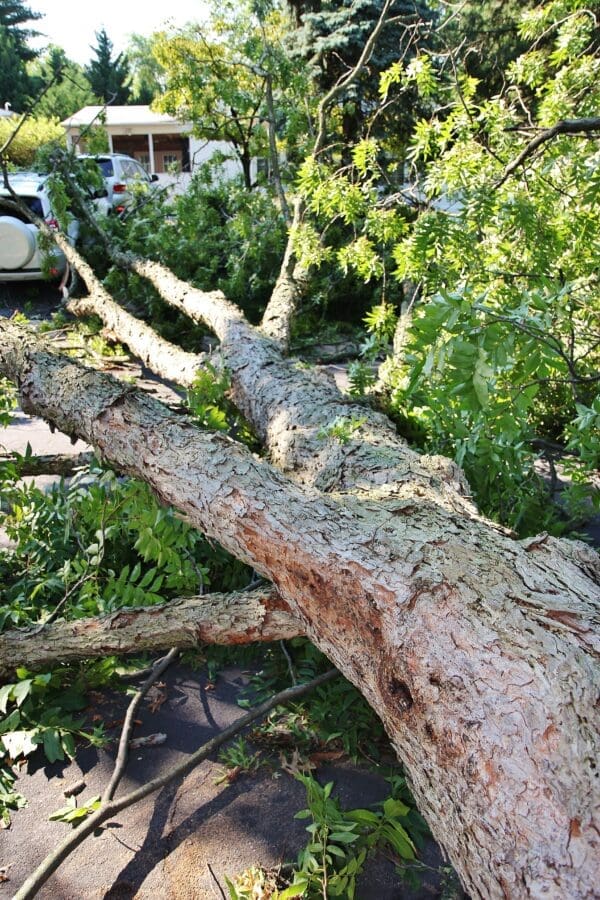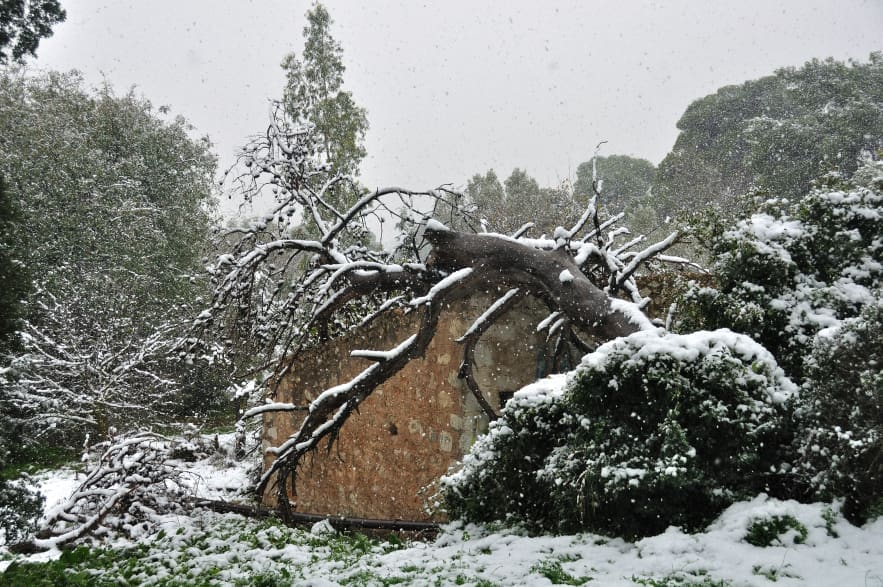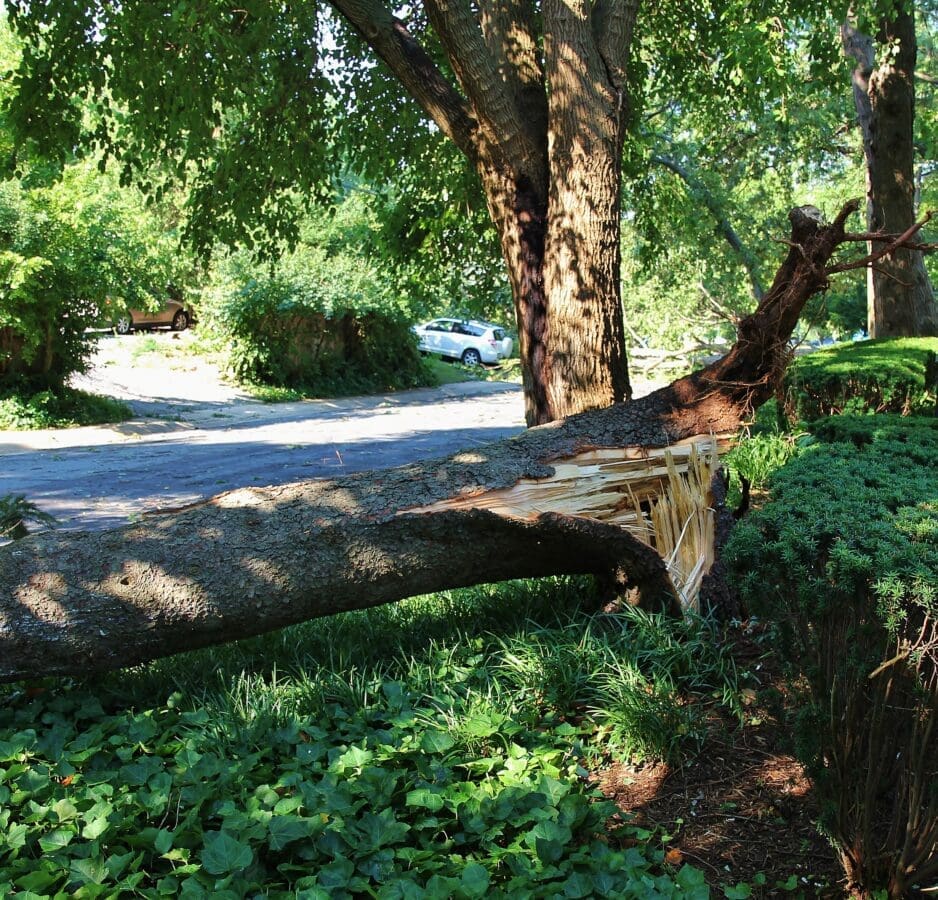
Legal Liability for Tree Damage in Maryland, Virginia, and DC
One often-overlooked legal issue related to property disputes, property damage, and storms in Maryland, Virginia, and DC is potential legal liability related to tree damage, at risk trees, or fallen trees. Trees and other growth from a neighboring property can often cause damage and legal risk to a landowner/homeowner. Neighboring landowners have legal rights regarding adjacent trees and tree growth, and there is significant law in Maryland, Virginia, and DC regarding tree related lawsuits, tree disputes, and tree litigation. As a storm approaches or yearly growth increases, are you prepared for what could happen with your trees? Or your neighbors’ trees?
Tree disputes and tree removal has been the subject of a lot recent legal and litigation discussion. Tree laws and tree lawsuits can be a significant problem in Maryland, Virginia, and Washington DC. In one example, several lawsuits being filed by homeowners seeking to stop the utilities from removing beautiful mature trees growing on private land. Additionally adverse possession concerns can create tree dispute problems. Relying on the easements granted to them many years ago, the utilities are often permitted to remove trees that they deem to be a future threat to their power lines. Does a homeowner have a similar right? In other examples, our law firm has represented individuals against governments related to tree hazards/damage and against neighbors for tree hazards/damage. In general, the issues that can develop from fallen trees, dangerous trees, or hazardous trees include:
- The rights of a property owner to remove or trim their neighbor’s trees.
- The rights of a property owner to remove or trim their neighbor’s tree roots.
- The rights of a property owner to legally force the removal their neighbor’s trees.
- The rights of a property owner when a neighbor’s tree, tree limb, or roots damages their property.
- The potential legal liabilities of property owners when their trees threaten or actually cause damage to their neighbor’s property.
Questions related to tree-damage liability were recently addressed by former Maryland Attorney General Douglas Gansler, whose office was asked to provide written clarification about the state of Maryland law in this area. Specifically, the Attorney General made clear that under Maryland law, the right or duty of a homeowner to cut a neighbor’s encroaching tree branches back to the property line depends on the condition of the tree and the nature of the abutting property. If a neighbor’s tree encroaches over the property line and presents a danger to the homeowner, the burden is on the homeowner to protect his property by cutting the invading branches and roots to the extent that they protrude on the homeowner’s property. While the homeowner may be permitted to cut his neighbor’s encroaching branches, the homeowner is generally limited to cutting back growth the property line and the homeowner may not enter the adjoining homeowner’s property to remove the growth without the neighbor’s consent.
In fact, in a 1988 decision, the Maryland Court of Appeals specifically held that a landowner could not bring a lawsuit against a neighbor whose trees and other vegetation encroached and damaged his property. In Melnick v. C.S.X. Corp., Maryland’s highest court followed what is known as the “Massachusetts Rule” which in most cases limits the remedy of the landowner that is harmed to self-help – that is, the landowner cannot sue for damage if owner could have removed the encroaching limbs themselves. As noted by the Court of Appeals,
We have gotten along very well in Maryland, for over 350 years, without authorizing legal actions of this type by neighbor against neighbor.
 Thus landowners in Maryland are provided with certain legal rights to themselves control their neighbor’s living trees, plants, roots, or vines that have encroached on their land within Maryland. This legal right in Maryland is referred to as “self help.” While self-help is often the remedy to be used by a neighbor in the face of an encroaching living tree, such a remedy is not always the case. A landowner can still be held liable where dead or dying tree limbs from trees on his property injure others. For example, in Hensley v. Montgomery County, the Maryland’s Court of Special Appeals found that the owner of rural or suburban forest land is not liable for the damage done by dead tree limbs falling onto property unless the tree constitutes a “danger to lawful users of abutting public roads and the owner is aware or should be aware of the tree’s deteriorated condition.” The court differentiated the difference between a rural owner (such as Potomac, Maryland) and an urban or suburban owner (such as Rockville, Maryland or Bethesda, Maryland), But what duty does the rural landowner have relative to learning the health of his rural trees? The Hensley court noted that the general rule was that the rural landowner did not have a duty to inspect rural trees abutting public roads for dead or decaying limbs due to the practical difficulty of doing so, however, in a more urban setting, since the landowner may only be responsible for a few trees (which can be more easily inspected), there will exist a duty to use due care to protect others from damage or injury caused by dead or decaying trees.
Thus landowners in Maryland are provided with certain legal rights to themselves control their neighbor’s living trees, plants, roots, or vines that have encroached on their land within Maryland. This legal right in Maryland is referred to as “self help.” While self-help is often the remedy to be used by a neighbor in the face of an encroaching living tree, such a remedy is not always the case. A landowner can still be held liable where dead or dying tree limbs from trees on his property injure others. For example, in Hensley v. Montgomery County, the Maryland’s Court of Special Appeals found that the owner of rural or suburban forest land is not liable for the damage done by dead tree limbs falling onto property unless the tree constitutes a “danger to lawful users of abutting public roads and the owner is aware or should be aware of the tree’s deteriorated condition.” The court differentiated the difference between a rural owner (such as Potomac, Maryland) and an urban or suburban owner (such as Rockville, Maryland or Bethesda, Maryland), But what duty does the rural landowner have relative to learning the health of his rural trees? The Hensley court noted that the general rule was that the rural landowner did not have a duty to inspect rural trees abutting public roads for dead or decaying limbs due to the practical difficulty of doing so, however, in a more urban setting, since the landowner may only be responsible for a few trees (which can be more easily inspected), there will exist a duty to use due care to protect others from damage or injury caused by dead or decaying trees.
Accordingly, while in Maryland, an owner of rural or suburban forest land may likely not be liable for damage done by dead tree limbs falling onto the property or persons of others unless the tree constitutes a danger to lawful users of abutting public roads and the owner is aware or should be aware of the tree’s deteriorated condition, a urban homeowner may very well be liable for the same injury since the owner will likely have far fewer trees to inspect and, therefore, is seen to have a duty to know about the existence of dead or decaying trees on the owner’s urban property.
TREE DAMAGE IN WASHINGTON, DC
Washington, DC has less guidance than Maryland regarding tree damage liability. While Washington, DC formerly followed the same “Massachusetts Rule” that Maryland follows, Washington, DC decided in 1960 to follow a slightly different rule.
In 1960, the highest court in Washington, DC stated in Dudley v. Meadowbrook, Inc.:
We think the sound and practical rule is that liability in such cases is to be determined by the test of negligence and that a landowner should be held to the duty of common prudence in maintaining his property, including trees thereon, in such a way as to prevent injury to his neighbor’s property.
Following the Dudley case Washington, DC courts simply ask, if necessary: “Did plaintiff make out a prima facie case to show that defendant landowners had been negligent?” This DC rule was supported by the same highest court in the 2008 case of Tolu v. Ayodeji. Thus, if a tree falls in Washington, DC on a neighboring property, the ordinary laws of negligence will apply.
TREE DAMAGE IN VIRGINIA
In 2007, the Supreme Court of Virginia made a ruling that differs from the general rules in Maryland and Washington, DC related to tree liability and tree damage in Virginia. In Fancher v. Fagella, the Virginia Supreme Court held that where a neighbor’s tree causes harm or poses an imminent danger of harm to an adjoining property, the tree owner “may be held responsible” for this harm. This tree danger determination was new law in Virginia. The Fancher court clarified that its prior rule was for
times when the population was far less densely concentrated than at present, and more often engaged in agriculture.
In a clarification decision in 2012, the Virginia Supreme Court decided not to extend the Fancher ruling to rural settings. In Cline v. Dunlora South, LLC, the court specifically stated “this Court has never recognized, nor do our precedents support, a ruling that a landowner owes a duty to protect travelers on an adjoining public roadway from natural conditions on his or her land.”
Longman & Van Grack’s litigation attorneys consist of lawyers who have handled many different types property lawsuits, tree disputes, tree damage lawsuits in many courts throughout Maryland, Virginia, and Washington, DC. We have also address property issues related to fence laws and adverse possession. Our tree dispute and property dispute attorneys have handled tree lawsuits and property lawsuits in Montgomery County Circuit Court (Rockville, MD), Prince George’s County Circuit Court (Upper Marlboro, MD), Howard County Circuit Court (Ellicott City, MD), Frederick County Circuit Court (Frederick, MD), Baltimore County Circuit Court (in Towson, MD), and DC Superior Court (in Washington DC). If you would like to discuss our assistance with a litigation, tree, or property matter, call Longman & Van Grack’s attorneys today at (301) 291-5027 to schedule a consultation in our Bethesda, Maryland, Rockville, Maryland, or Washington, DC offices. Feel free to ask to speak with one of our two real property litigators directly: Adam Van Grack or Theodore Kiviat.


